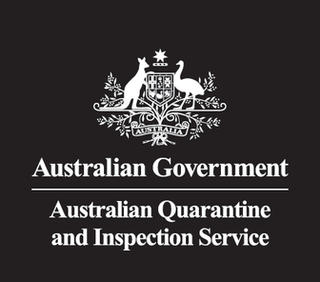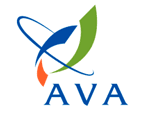Related Research Articles

Organic certification is a certification process for producers of organic food and other organic agricultural products. In general, any business directly involved in food production can be certified, including seed suppliers, farmers, food processors, retailers and restaurants. A lesser known counterpart is certification for organic textiles that includes certification of textile products made from organically grown fibres.
The Canadian Food Inspection Agency is a regulatory agency that is dedicated to the safeguarding of food, plants, and animals (FPA) in Canada, thus enhancing the health and well-being of Canada's people, environment and economy. The agency is responsible to the Minister of Health.

The Australian Quarantine and Inspection Service was the Australian government agency responsible for enforcing Australian quarantine laws, as part of the Department of Agriculture.

The Codex Alimentarius is a collection of internationally recognized standards, codes of practice, guidelines, and other recommendations published by the Food and Agriculture Organization (FAO) and World Health Organization (WHO) of the United Nations relating to food, food production, food labeling, and food safety.
AsureQuality Limited is a State-Owned Enterprise (SOE) fully owned by the government of New Zealand. The company's core business is food quality assurance with its services including certification, inspection, testing, and training. AsureQuality has over 1700 staff at over 100 locations throughout New Zealand. AsureQuality also has a joint venture partner, Bureau Veritas.. Bureau Veritas and AsureQuality have two joint ventures, BVAQ Australia and BVAQ SouthEast Asia.
A food safety agency or food administration or Food Safety Authority is a government agency responsible for ensuring the safety, quality, and proper labeling of food products within a country or region. These agencies play a crucial role in protecting public health by establishing and enforcing regulations and standards to ensure that food produced, imported, processed, distributed, and sold is safe for consumption.

Food safety is used as a scientific method/discipline describing handling, preparation, and storage of food in ways that prevent foodborne illness. The occurrence of two or more cases of a similar illness resulting from the ingestion of a common food is known as a food-borne disease outbreak. This includes a number of routines that should be followed to avoid potential health hazards. In this way, food safety often overlaps with food defense to prevent harm to consumers. The tracks within this line of thought are safety between industry and the market and then between the market and the consumer. In considering industry-to-market practices, food safety considerations include the origins of food including the practices relating to food labeling, food hygiene, food additives and pesticide residues, as well as policies on biotechnology and food and guidelines for the management of governmental import and export inspection and certification systems for foods. In considering market-to-consumer practices, the usual thought is that food ought to be safe in the market and the concern is safe delivery and preparation of the food for the consumer. Food safety, nutrition and food security are closely related. Unhealthy food creates a cycle of disease and malnutrition that affects infants and adults as well.

The Ministry of Food Processing Industries (MOFPI) is a ministry of the Government of India responsible for the formulation and administration of the rules, regulations, and laws related to food processing in India.

Food safety in China is a widespread concern for the country's agricultural industry and consumers. China's principal crops are rice, corn, wheat, soybeans, and cotton in addition to apples and other fruits and vegetables. China's principal livestock products include pork, beef, dairy, and eggs. The Chinese government oversees agricultural production as well as the manufacture of food packaging, containers, chemical additives, drug production, and business regulation. In recent years, the Chinese government attempted to consolidate food safety regulation with the creation of the State Food and Drug Administration of China in 2003; officials have also been under increasing public and international pressure to solve food safety problems. Chinese Vice Premier Li Keqiang said, "Food is essential, and safety should be a top priority. Food safety is closely related to people's lives and health and economic development and social harmony," at a State Council meeting in Beijing.

Ractopamine is an animal feed additive used to promote leanness and increase food conversion efficiency in farmed animals in several countries, but banned in others. Pharmacologically, it is a phenol-based TAAR1 agonist and β adrenoreceptor agonist that stimulates β1 and β2 adrenergic receptors. It is most commonly administered to animals for meat production as ractopamine hydrochloride. It is the active ingredient in products marketed in the US as Paylean for swine, Optaflexx for cattle, and Topmax for turkeys. It was developed by Elanco Animal Health, a former division of Eli Lilly and Company.

The Agri-Food and Veterinary Authority of Singapore (AVA) was a statutory board under the Ministry of National Development that regulated food safety, safeguarded animal and plant health, and facilitated the agri-food and fisheries trade sectors. AVA was disbanded on 1 April 2019, with duties being transferred to other statutory boards, Singapore Food Agency, National Environment Agency, Health Sciences Authority, and National Parks Board.
There is a high use of pesticides in New Zealand due predominantly to the large agricultural industry.

In New Zealand, agriculture is the largest sector of the tradable economy. The country exported NZ$46.4 billion worth of agricultural products in the 12 months to June 2019, 79.6% of the country's total exported goods. The agriculture, forestry and fisheries sector directly contributed $12.653 billion of the national GDP in the 12 months to September 2020, and employed 143,000 people, 5.9% of New Zealand's workforce, as of the 2018 census.

The Food Safety Modernization Act (FSMA) was signed into law by President Barack Obama on January 4, 2011. The FSMA has given the Food and Drug Administration (FDA) new authority to regulate the way foods are grown, harvested and processed. The law grants the FDA a number of new powers, including mandatory recall authority, which the agency had sought for many years. The FSMA requires the FDA to undertake more than a dozen rulemakings and issue at least 10 guidance documents, as well as a host of reports, plans, strategies, standards, notices, and other tasks.

The Food Safety and Inspection Service (FSIS), an agency of the United States Department of Agriculture (USDA), is the public health regulatory agency responsible for ensuring that United States' commercial supply of meat, poultry, and egg products is safe, wholesome, and correctly labeled and packaged. The FSIS draws its authority from the Federal Meat Inspection Act of 1906, the Poultry Products Inspection Act of 1957 and the Egg Products Inspection Act of 1970.
The Food Act is a New Zealand Act of Parliament passed in 2014. It came into force on 1 March 2016 and progressively replaced the Food Act 1981 for the next three years.

Animal welfare in New Zealand is governed by the Animal Welfare Act 1999 and a number of organisations actively advocate for both animal welfare and animal rights. Pest control and farming practices have been scrutinised with respect to animal welfare issues. The legality of killing dogs and cats for consumption has also been criticized.

Food safety in New Zealand is a concern by the general public and the government takes measures to regulate it. The estimated cost to the country in 2009 of the six foodborne illnesses campylobacteriosis, salmonellosis, norovirus, yersiniosis, STEC and listeriosis was NZ$161 million.

The Department of Agriculture, Fisheries and Forestry (DAFF) was an Australian government department that existed between 1998 and 2013, when it was renamed as the Department of Agriculture. DAFF's role was to develop and implement policies and programs that ensure Australia's agricultural, fisheries, food and forestry industries remained competitive, profitable and sustainable.
The Australian Department of Agriculture, Water and the Environment (DAWE) was an Australian Government department which operated from 1 February 2020 until 30 June 2022. It represented Australia's national interests in agriculture, water and the environment.
References
- ↑ "Profile, July 2007" . Retrieved 29 December 2007.
- ↑ About FSA
- ↑ foodsafety.govt.nz Proposed Food Bill
- ↑ "Regulatory Impact Statement 2009" (PDF). Archived from the original (PDF) on 9 February 2013. Retrieved 25 May 2012.
- ↑ New Zealand and Codex